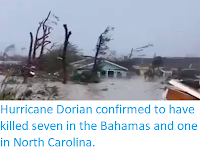Two houses have been destroyed in a landslide above the Tennessee River in Hardin County, Tennessee, on Saturday 15 and Sunday 16 February 2020. The incident happened in the evening in the Chalk Bluff area acording to the Hardin County Fire Department. Only one of the houses was occupied, and that was evacuated earlier in the day, when it became clear the location had become extremely unstable. The landslip appears to have been caused by high floodwaters on the river below, which appear to have washed away sediments at the base of the hillslope, undermining the layers above.
Drone picture of the landslide on Chalk Bluff on the Tennessee River, taken at about 5.30pm, local time. The house on the left collapsed about an hour later, the house on the right the following day. Hardin County Fire Department/Facebook.
Flood-related incidents are not unusual in Tennessee at this time of year, although this winter has seen more than usual. This is probably related to the El Niño system currently present over the Pacific Ocean, which can bring warmer, wetter air to the southerb US than is typical for the time of year.
The
El Niño is the warm phase of a long-term climatic oscillation affecting
the southern Pacific, which can influence the climate around the world.
The onset of El Niño conditions is marked by a sharp rise in
temperature and pressure over the southern Indian Ocean, which then
moves eastward over the southern Pacific. This pulls rainfall with it,
leading to higher rainfall over the Pacific and lower rainfall over
South Asia. This reduced rainfall during the already hot and dry summer
leads to soaring temperatures in southern Asia, followed by a rise in
rainfall that often causes flooding in the Americas and sometimes
Africa. Worryingly climatic predictions for the next century suggest
that global warming could lead to more frequent and severe El Niño
conditions, extreme weather conditions a common occurrence.
Predicted changes to North American weather patterns during an El Niño event. NWS/NCEP Climate Prediction Center/NOAA.
See also...
Follow Sciency Thoughts on Facebook.








